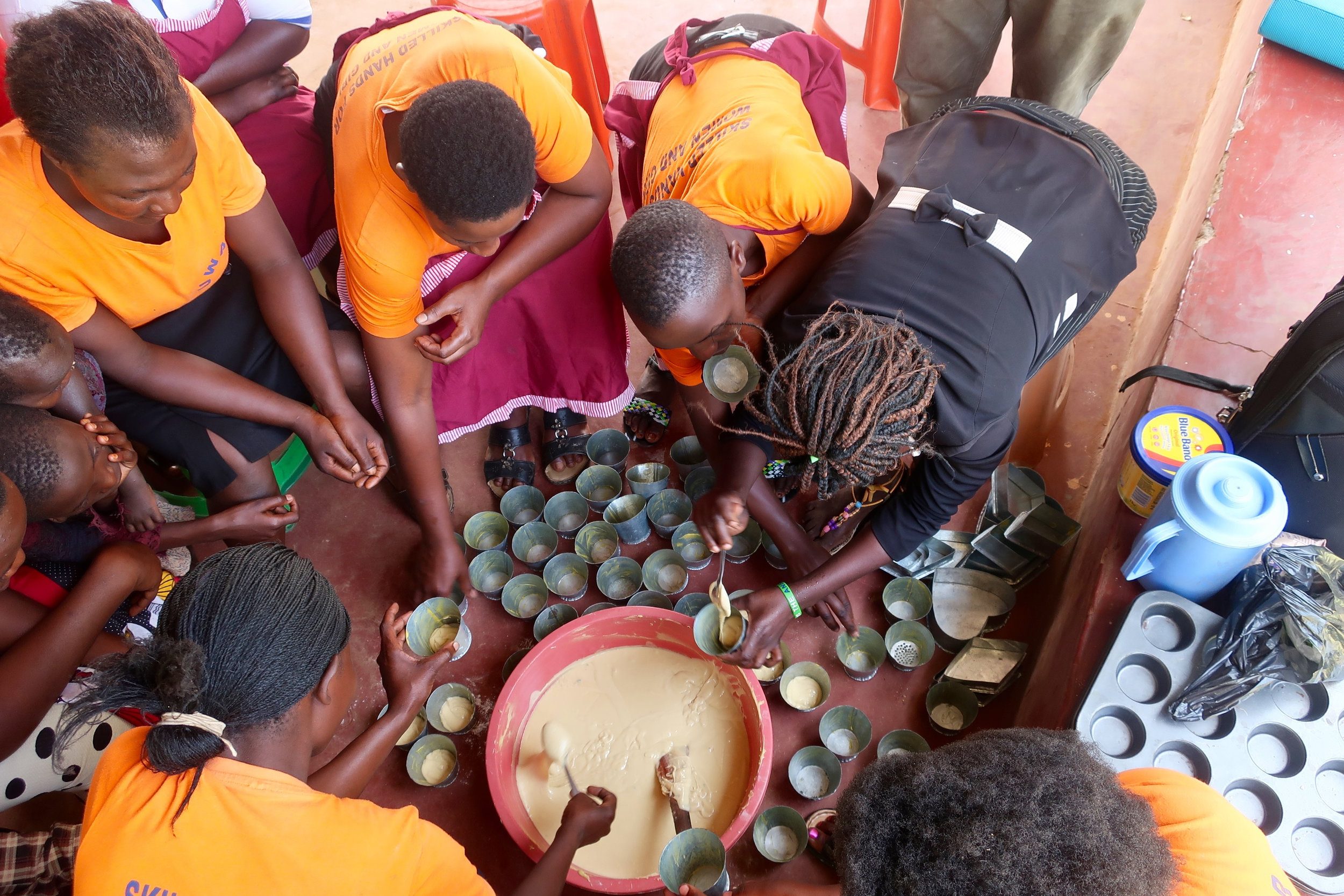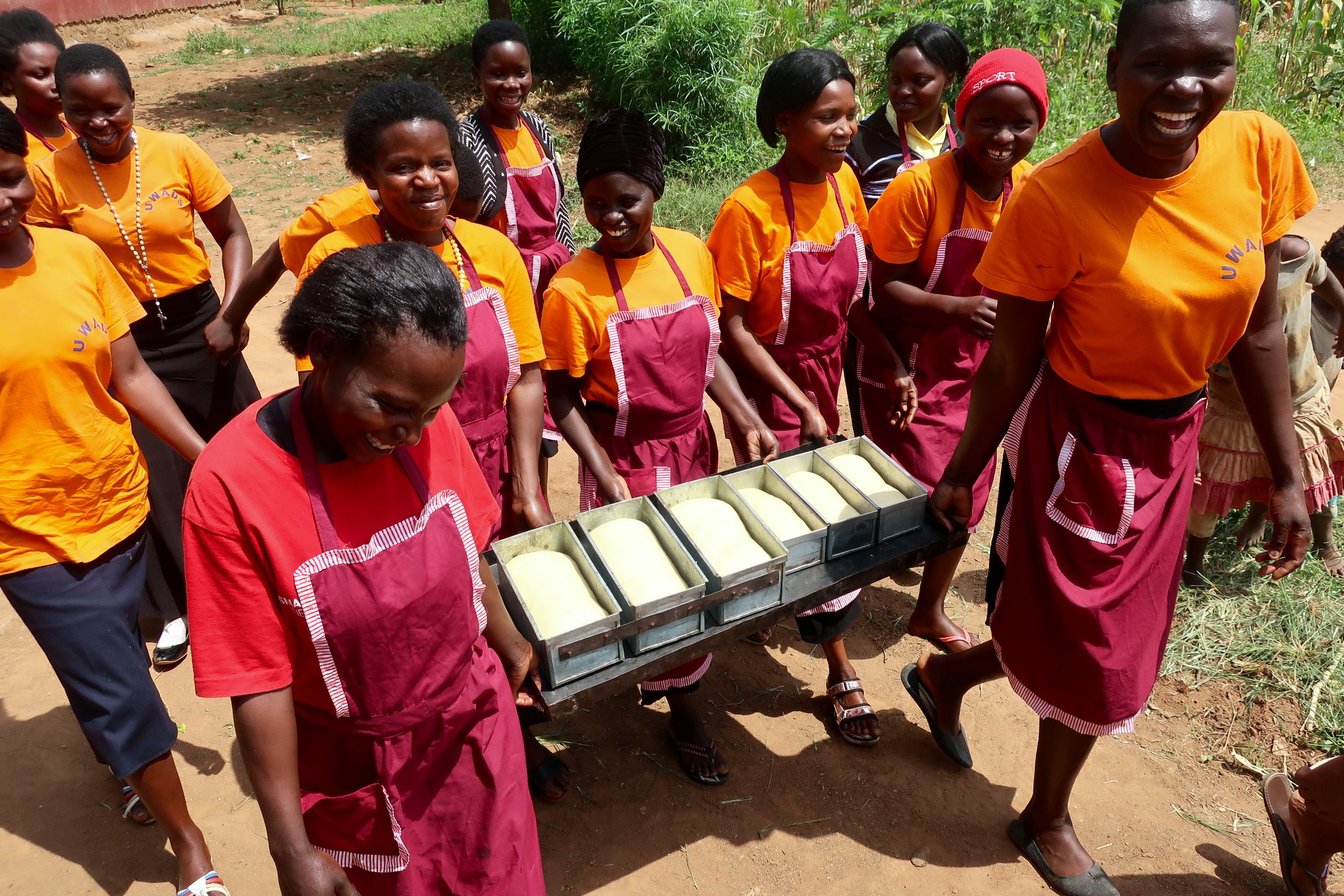GUEST BLOG BY TAYLOR WASHBURN AND EMILY CHANDLER, GLOBAL AMBASSADORS FOR ROCKFLOWER
We arrived in Mbale on July 25th after a day of travel. Mbale is in eastern Uganda, near the Kenyan border and at the base of Mount Elgon. Moreen and Moses from the Uganda Women’s Advocacy and Development Services (UWADS) met us at our hotel that evening to brief us on the day ahead. Both were full of energy, and the short meeting left us excited about the day ahead. Their project has strong similarities to RUGLI in Kasese in structure and sustainability which filled us with optimism.
Moreen and Moses arrived shortly after 10AM the next morning to take us to the UWADS office to see where they work and also offer computer skills training courses. After a quick tour, we headed out to the site of the community baking project. UWADS runs a number of different projects in 15-20 villages around Mbale. Though not something we had thought about during our homestay with Mama Ali, baked goods are not common in Uganda. Most families cook meals outside over an open flame, and an oven or even knowledge of baking is the exception rather than the rule. During our drive to the site, we learned how intentional Moreen and Moses had been both in choosing the project and the specific community in which to begin their baking initiative. The baking program, which Rockflower supported by funding the construction of a wood-fired brick oven, is located in a nearby village with many young mothers. The average age at which women have their first child here is 14 years old. These women may or may not have husbands and, in most cases, they have little to no financial independence or support.
A critical component of success we identified in the projects we visited is a path to self-sustainability. The initiatives that begin with group saving schemes have found a solid financial footing from which to grow their programs, and the UWADS baking program is no exception. The baking program started by encouraging women in the village to save whatever they could each week. As they built their group savings, they established leadership roles (treasurer, secretary, and chairperson) and began lending money to members when they needed a loan. The loans could be used to buy food or pay school fees for their children. For the baking project to succeed, the group of women needed to have marketable skills, skills that UWADS focused on developing before helping the women start a business. Along with computer literacy, UWADS offers a program in financial literacy to help empower women to be financially independent.
With the savings program in place, this group of 20 women already had a community, buy-in, and ownership. The next step was finding a way to generate revenue. UWADS, namely Moreen and Moses, provided baking classes and an oven. Because most people cook over a wood or charcoal fire, they have no experience with baking. Additionally wheat is not a significant crop here, so most Ugandans are more accustomed to working with corn or millet flour than wheat flour. Consequently, baking is a marketable skill. Through the baking class, UWADS has trained 20 women in how to bake bread and rolls, donuts and mandazi, cakes (more like muffins) and chapati. The women and girls meet twice a week to bake and then take turns selling their products at the market. Profits come back to the group to help buy more supplies or go into the group savings to provide loans to members. On the days not devoted to group baking, members can bake on their own and then sell the products and keep the revenue. They have access to the community oven and can take out loans to help pay for baking supplies. Women in the group are using these skills and the income to pay for their children’s school fees, buy food and make food for their families. Just as importantly, they’ve built a proud, empowered community. They are also sharing their knowledge of baking with other women and expanding the community.
Watching the group work, we were struck by how lucky they seemed. They have an incredible space where they work and have built their wood-fired oven. In the community, there is a generous man who owns a large building along with a covered pavilion that he allows the women to use to prep their products. The oven is located behind the building, so it is a perfect communal space. Of course, this was not chance, but the result of Moreen and Moses careful planning. More than luck, though, what we noticed was the spirit these women possessed. They were enthusiastic, they were empowered, and they had a strong group identity. They loved the work they were doing and they loved working with each other.
Throughout the morning, we watched women and girls roll out doughs, cut out donuts and fill muffin pans. We had the chance to talk with a number of them and were inspired by the energy and optimism of the group. A few of the women had the opportunity to introduce themselves more formally and speak to what the baking project means to them. Seeing the confidence they had developed to stand up in front of a group and share, in English, what learning these skills means for their independence was inspiring.
After sharing a little bit about our work with Rockflower and the opportunity to visit with many of our partners in Uganda we were treated to a performance by the local brass band. The brass band, much like the baking project, is not typical. The community supports young boys and girls learning to play instruments. The band performs throughout the year, and income generated by those performances help pay the children’s school fees. Before leaving, we were able to enjoy a meal with all of these different community members and sample the baked goods. We left Mbale feeling optimistic about this project, both because of the lives it has already so clearly impacted as well as for the clear path to sustainability and expansion.





